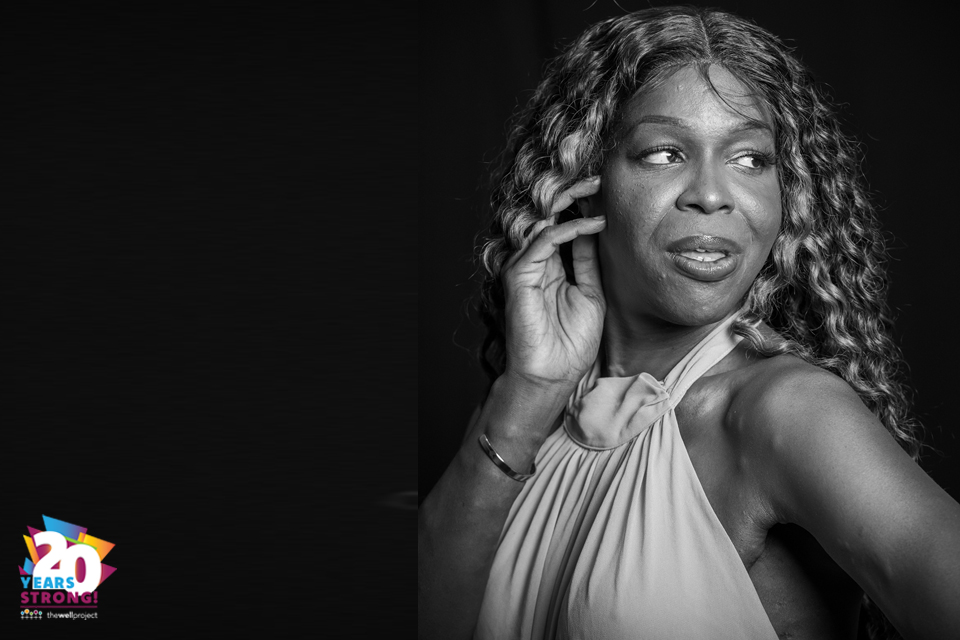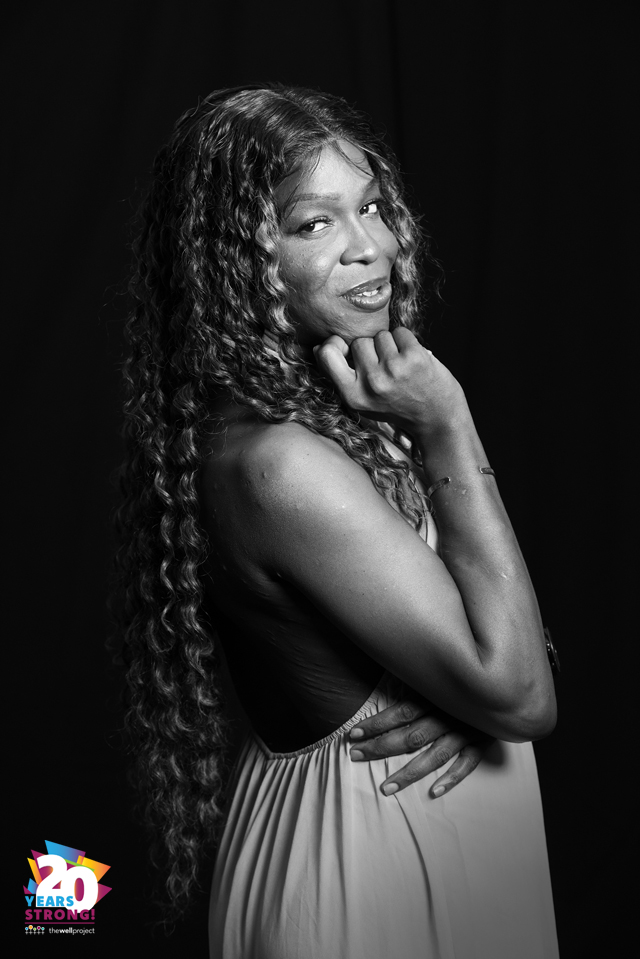Hearts and Minds of The Well Project is a storytelling project that shines a spotlight on some of the extraordinary individuals who have been instrumental over the past 20 years in making The Well Project the organization it is today. The series features portraits of women living with HIV, members of our community advisory board and board of directors, staff members, partners, and other allies of The Well Project. In honor of our 20th anniversary year, we released 12 new stories between November 2022 and November 2023 to highlight the diversity of our community. Read all the stories in the Hearts and Minds of The Well Project series
Table of Contents
A Long Walk to Beloved Community
I am located in Virginia, on the coast, on Chesapeake land in the Hampton Roads area. I was born in New York – Far Rockaway, Queens, to be exact. My dad was born in Queens, and all of his side of the family lives there. My mom is from rural Georgia, so we moved to Washington County, Georgia, when I was 10 years old. From there through the rest of my teens, I lived in a county of less than 20,000 people. Community for me was family – not just my brothers and my parents, but also my aunts, uncles, cousins, and grandparents. My mom was really into a conservative religion. Congregation members were the only other sense of community that I had.
There were only two individuals that were out as LGBTQ community members within the whole county. That fed into me feeling alienated from humanity.
Going through my teens and going through puberty in Georgia, I started to realize that some of my internal thinking was incongruent with what I was being told was right. This was during the '90s. Especially in rural places in the South, there wasn't any education on, you know, You could be trans, or You could be part of the LGBTQ community. There were only two individuals that were out as LGBTQ community members within the whole county. That fed into me feeling alienated from humanity, in a sense – that there was no one like me, and what I was going through was unlike what anyone else was. During that time I went through a lot of depression, a lot of suicidal ideation.
If you are thinking of hurting yourself or committing suicide, please tell someone immediately. In the US, you can call 1-800-SUICIDE (1-800-784-2433) or 1-800-273-TALK (1-800-273-8255). To find a suicide hotline near you, try http://www.suicide.org/suicide-hotlines.html; this website lists US hotlines by state as well as hotlines by country (click on the "International Hotlines" link at the top of the main page). Trans Lifeline (US, 877-565-8860; Canada, 877-330-6366) is a peer support line run by and for trans people that may also be a resource for you.
I went to a private Christian college. I had a really big suicide attempt in college that was due to being put into anti-gay conversion therapy. I eventually went back to New York in my late teens. That's when I started to get the education from the LGBTQ community, met my first trans people who helped me really find myself within community that I didn't even know existed until then.
When I went back to New York, I stayed with family because that was, at that point, still the only community I had. I stayed with my aunts and uncles. We had some issues. There was a big argument, and I ended up leaving and walking from Queens (which is almost Long Island) all the way to Manhattan. It took about 12 hours. I just had a backpack and my CD book – back in the day when you used to have the CDs in the little sleeves and stuff.
What I'm really happy about with having my godchildren in my life Is that I'm able to give children that general education that I was missing.
I ended up going into a phone booth and there was a Gay and Lesbian Yellow Pages. I looked for resources and found Callen-Lorde Community Health Center. Their current managing director of medicine, Anthony Vavasis, was the first person I met when I went over there. He recommended that I go to one of the youth shelters that was there, Covenant House. Unbeknownst to me, that was a go-to for a lot of young trans people that needed someplace to stay. Some trans people even used it like hotel accommodations when they came into New York from out of town. They had about a month of a place to stay that they didn't have to pay for, to rest their head while they just did their thing and enjoyed the city.
I met so many great people that had a lot of more of this life experience as TGNC (trans and gender nonconforming) people. From that point onward it was more of acquiring extended family members that helped me become who I am, and gain confidence in individuality and self, and know that there's no single definition to gender or sexuality or identity. All is right. That was one thing, outside of medication and seeing this psychiatrist or that psychologist, that really helped me get a handle on my depression, and be able to see what life could really be about.
After that I started doing some part-time work for the New York Peer AIDS Education Coalition (NYPAEC). I became a peer educator and started learning about STIs (sexually transmitted infections), HIV and AIDS, how to use safe drug kits and safer sex kits. I started doing outreach in my community. That was my first education into some of the things that greatly affect us as BIPOC (Black, indigenous, and other people of color) LGBTQ individuals.
Struggle, Expression, Connection
After starting my transition, I lost a few privileges that I had had as a Black cisgender person. Even after moving to Miami in 2005, there were still so many rights and accesses that we just didn't have as a community. I had built out the first trans organization in Miami-Dade County, Florida. But even after that success, there was still so much that wasn't available to me or other people like me. Even being executive director of an organization, I still was dealing with underemployment, unemployment, homelessness, and lack of gender-affirming health services. With my community, I was and still am fighting the fight for equity, so that we have the same access to everything that a person that is born here on this earth should have accessible to them in order to have a good quality of life.
A lot of the trans people are very dear to me. It's that shared lived experience that keeps us bonded.
There was an organization called Arianna's Center that during that time had reached out to me as they broadened out their work in South Florida. I started working with Arianna Lint, who was connected to The Well Project. At that time, I had been living with HIV for a few years, but I wasn't open about it. I joined the A Girl Like Me blog and that blog is where I talked about my diagnosis for the first time publicly.
For women and girls and feminine-identified individuals around the world, many of us may be in places where HIV education and other types of education aren't readily available. I really love The Well Project as a place for that.
My community now is the same individuals, the same peer spaces that I found myself at in my late teens in New York. A lot of the trans people are very dear to me. It's that shared lived experience that keeps us bonded. There's connections through trauma and oppression that get made that are a lot more fortified than any connections that we have with other individuals – which is why it's so intimate with our blood and family, because we automatically have those connections. But when you find those even outside of your blood, especially if you're doing whatever is in your control to move you and your people beyond the trenches, those bonds pretty much stay.
Trans individuals, especially Black trans women, are my go-to for feeling a sense of community and of talking to someone where you don't have to overly explain certain things that you've been through; they get it.
Nourishing Future Generations
I have seven godchildren, all of whom lived with me for at least the first few years of their lives. Currently, I'm living with my youngest godson and his parents. He's going to be 3 in May. What I'm really happy about with having my godchildren in my life Is that I'm able to give children that general education that I was missing. My oldest godson will be 21 this year, and one of his friends had started talking about transitioning. He hit me up, got some good data and resources, and was able to help his friend.
When I think back to me as a depressed, alienated child, if I had someone that was able to give me that information? Now there's more education and access on what it means to be an individual within this world, no matter what those intersectionalities are – womanhood, femininity, transness, gender or gender nonconformity, along with all the racial nuances. It's good to see more of that being talked about on a public forum that I didn't see within my generation.
This narrative has been edited and condensed for clarity from a longer conversation.
Aryah Lester is a member of The Well Project's board of directors and a former A Girl Like Me blogger and community advisory board member. She is a co-director of Transgender Strategy Center, a partner organization of The Well Project.
Read all the stories in the Hearts and Minds of The Well Project series





